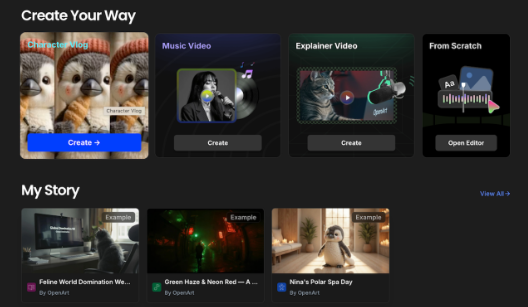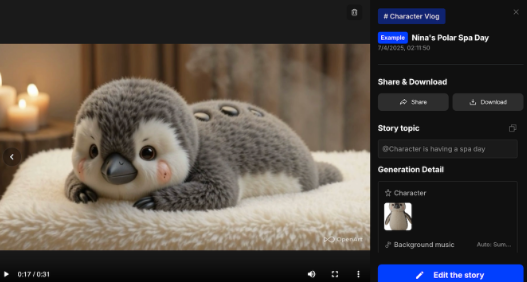【AIbase Report】With the development of artificial intelligence technology, a video called "Brain Rot" is rapidly gaining popularity on the Internet, especially among young users. These videos are known for their imaginative creativity, such as "sharks wearing sneakers" and "ballet dancers with cappuccino on their heads," and such peculiar characters keep emerging. Behind this trend, a startup company named OpenArt has played an important role. Founded in 2022 by two former Google employees, the company now has about 3 million active users per month and has become a significant force in the AI creation field.

To further lower the barrier to AI creation, OpenArt recently launched a new feature called "One-Click Story," which is now in public beta testing. Users can quickly generate a one-minute video with a complete storyline by simply entering a sentence, a script, or even a song. This feature offers three templates: "Character Vlog," "Music Video," and "Explanatory Video." The diverse content formats can meet entertainment needs on TikTok, as well as more serious creative scenarios such as YouTube commentary videos or music MVs, and even be used for advertising.
The core advantage of OpenArt lies in its strong ability to maintain character consistency. Mao Xiaotong, co-founder and CEO of the company, said that many AI tools struggle to maintain character consistency within the same video, but OpenArt has solved this problem through technological innovation, ensuring visual and narrative coherence, allowing viewers to better immerse themselves in the story.
The platform aggregates over 50 AI models, including DALLE-3, GPT, Imagen, Flux Kontext, and Stable Diffusion, and users can freely choose according to their preferences. In the future, OpenArt plans to add support for two-character dialogues and develop a mobile application to continuously improve the user experience.

Although AI-generated tools have brought unprecedented convenience to content creation, they also come with a series of ethical and legal challenges that need to be addressed. The most prominent ones include imitating other artists' styles, intellectual property infringement, and the risk of generating false information. OpenArt admitted that its "Character Vlog" feature may fall into a legal gray area, as some of the character types it provides (such as Pikachu and SpongeBob) may infringe on intellectual property rights.
Mao Xiaotong responded that the company has used technical means to avoid such issues as much as possible, but mistakes may still occur. He stated that OpenArt is willing to negotiate with major intellectual property holders to seek character authorization. He reminded users that if a video is found to infringe copyright, it may face removal or even legal action.
OpenArt operates on an points-based system, offering various packages ranging from $14 to $56 per month. The company has raised $5 million in funding from Basis Set Ventures and DCM Ventures, and it has already achieved positive cash flow, with expected annual revenue exceeding $20 million.
